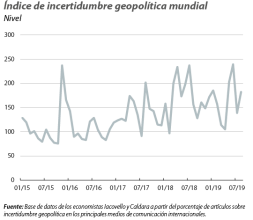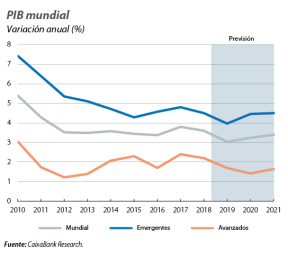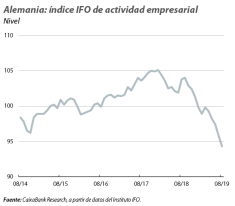| Home |  Version imprimable Version imprimable |
On the Crisis : Where is the World Going ? (Nuevo Curso)
Lacking space in this issue, time and strength too, we are not in a position to present a state, even if only a summary one, of the worsening economic crisis of capital that worries the bourgeoisie itself so much. The measures taken from 2008 onwards and the ’subprime’ crisis have not succeeded in ’relaunching the machine’ as in previous crises. Roughly, they had consisted in the ’nationalization’ of the private debt accumulation in order to avoid the sudden collapse of the financial system; and in the massive introduction of liquidity (in particular through the Quantative Easing) by central banks to compensate for the lack of credit, defiant banks no longer lending themselves. All this at the cost of the exponential indebtedness of the States and public deficits. Certainly, these economic measures specific to state capitalism succeeded in avoiding the brutal blockage of the capitalist economy and its catastrophic collapse. But they did not ’overcome’ the 2008 crisis and ’really boost the economy’ to the point that these exceptional measures became permanent; to the point that the European Central Bank decided to boost the use of Quantitative Easing again these days [1]; to the point that the American bank, the Fed, is forced to lower its rates, which they had previously tried to raise. All this expresses that capitalism has become addicted to measures that should only be exceptional. And that the generalized debt continues its mad rush... that it will have to be paid for one day somehow or another – most likely by a generalized imperialist war.
Is it necessary to underline that the gigantic cost of the bankruptcy of that time, for which it is nevertheless necessary to pay in the meantime, and its multiple consequences has rested and still rests on the non-capitalist world population, mainly on the shoulders of the proletariat? This has led to a dramatic deterioration in living and working conditions since then and to increased and widespread impoverishment. The effects of 2008 are therefore still being felt and its various consequences, including economic and financial, have not been overcome at the very moment when economic activity is ’officially’ approaching the recession, as in Germany, or is slowing down ’officially’ in China or the United States, to mention only the main world capitalist powers, and even as the situation in the so-called ’emerging’ countries is deteriorating or even collapsing, as in Argentina. In short, the ’exceptional’ state measures – such as the negative interest rates of States [2] – to deal with the 2008 crisis, which only kept capital afloat, are still in place today even as the open crisis reappears. They cannot be reused with the same ’efficiency’ in the event of a sudden crisis and this is one of the concerns of the ruling classes – at least of their most ’enlightened’ economic specialists and governments. As a result, in addition to attacks on the proletariat, imperialist rivalries can only get even worse. Contrary to what the media are beginning to hammer at by trying to make us forget the evidence, the growing imperialist trade, monetary and tariff wars and tensions, especially Trump’s economic and imperialist policies, are not the cause of the economic slowdown and the coming open crisis but its consequence and expression. There is no doubt that the coming open crisis, the recession in particular, will only exacerbate imperialist rivalries and push for the major imperialist powers to engage more and more in the march towards generalized war.
There are several articles in the Communist Left press to which we invite our readers to refer. In particular, we draw their attention to two articles of the ICT, Panomarica sulle condizioni in cui versa el capitalismo global and Dotte considerazioni’ sul futuro del capitalismo ’dopo’ la fine dell’attuale crisi [3], only in Italian to date, which provide a general Marxist analysis of the worsening of the economic crisis that can serve as a useful reference. Failing that, we have decided to publish this short article by Nuevo Curso, which gives useful propaganda elements to any immediate class position in the face of the crisis and the bourgeoisie’s speeches.
Where is the World Going ? (in Graphs) - Nuevo Curso
In Argentina, Spain, Italy, even France, the media are sending us an increasingly empty message. They try to entertain us by imposing electoral emotions, hurricanes and violent crimes, while talking to us about ’difficulties’ as if they were local problems that, with a small sacrifice and ’good government’, could be solved. In reality, in capitalism as in everything, it is the totality, the state of the system as a whole, that determines the future of the parts. Global reality is not the sum of ’national realities’. On the contrary, today more than ever, it is the global situation of a global capitalism in crisis that determines the prospects in each country. In order to get an idea of what is happening for this second part of the year, we will summarize it with 7 graphs published this week.
1 - The first element of the world situation is the increase in imperialist tensions. The trade war, with its string of military pressures, wars and political frictions. From Ormuz to Hong Kong, via Brexit, Algeria, Syria, Cyprus... and now to the Amazon.

2 - The accumulation cycle is almost exhausted in central countries. Profit rates are very low – which is why the value of production is barely increasing – and even if the system is boosted by central banks in an increasingly desperate way, expectations and, above all, economic activity cannot be ’revived’.

3 - The stagnation of GDP is accompanied by a decline in economic activity, particularly industrial activity – the production of real goods – which leads to and accelerates even greater drops in activity. In other words: productive capacities are destroyed all over the world because the system does not know how to use them to generate profits.


The situation is so serious that the flight towards speculation is mainly concentrated in the countries cynically called ’emerging’. But these are no longer rising speculations, exaggerated expectations about future values and capabilities, but bets on falls and collapses that multiply instability, as we see in Argentina.

4 - It is not just that ’business is running bad’ for the bourgeoisie. It is that the only thing it can do to maintain its profits... is at the expense of our living conditions. On the one hand, by reducing the cost to national capital of maintaining operating conditions (health, basic services, etc.), and on the other hand by saving banks by directly appropriating savings in the form of pensions, by increasing real working time, precariousness, etc. From Bolsonaro to Macron, from Macri to Putin, from Sánchez to Costa, all defend similar ’reforms’ with similar objectives and different discourses. Even in the United States, for the moment the theoretical ’winner’ of the trade war, the impoverishment of workers is a constant trend that manifests itself in the stagnation of their consumption capacity. In other words: even in the country with the best employment data of the year, the system fails to improve the material lives of workers, not even on its own terms... which in turn feeds bad production expectations: why produce more if it can not be bought?

What is to be Done ?
Whether you are in Argentina, Mexico, Spain or Australia... the main task today is the same because the global situation that drives attacks on your living conditions and yours is the same as that which drives impoverishment for everyone everywhere in the world. The logic of capital is not without appeal. Or rather, it is only on its own terms. If we accept that the company’s profits or the profitability of national capital must be realized in order for our needs to be met, they will be increasingly attacked. And there is no sacrifice that pays. Because what makes the system so bad is structural. This is not a specific problem that could be solved through elections, ’reforms’ and trade agreements. The machine can only continue to operate by eating the workers. So it’s time to put our needs first.
Notes:
[1] . "For his last decision before leaving his post at the European Central Bank (ECB), Super Mario [Draghi] unveiled a major monetary stimulus plan to support economic activity, which is down in the euro zone. He lowered the deposit rate to -0.5% and announced the implementation of a new quantitative easing plan (QE)"(French newspaper La Tribune, September 13th 2019.
[2] . The creditor who ’lends’ his money to the States is not remunerated but on the contrary pays interest on his deposit! That is, he prefers to invest his money at a loss in the central banks’ cash registers rather than in the economy and production because he is convinced... that his initial capital will lose less. This aberration from the capitalist point of view alone illustrates the immediate impasse and contradictions facing capitalism today. Of course, this accumulation of capital that does not go into production also contributes to the vertiginous inflation of speculative bubbles in all fields, even in football, for example, where the budgets of professional clubs and players’ salaries are exploding...

